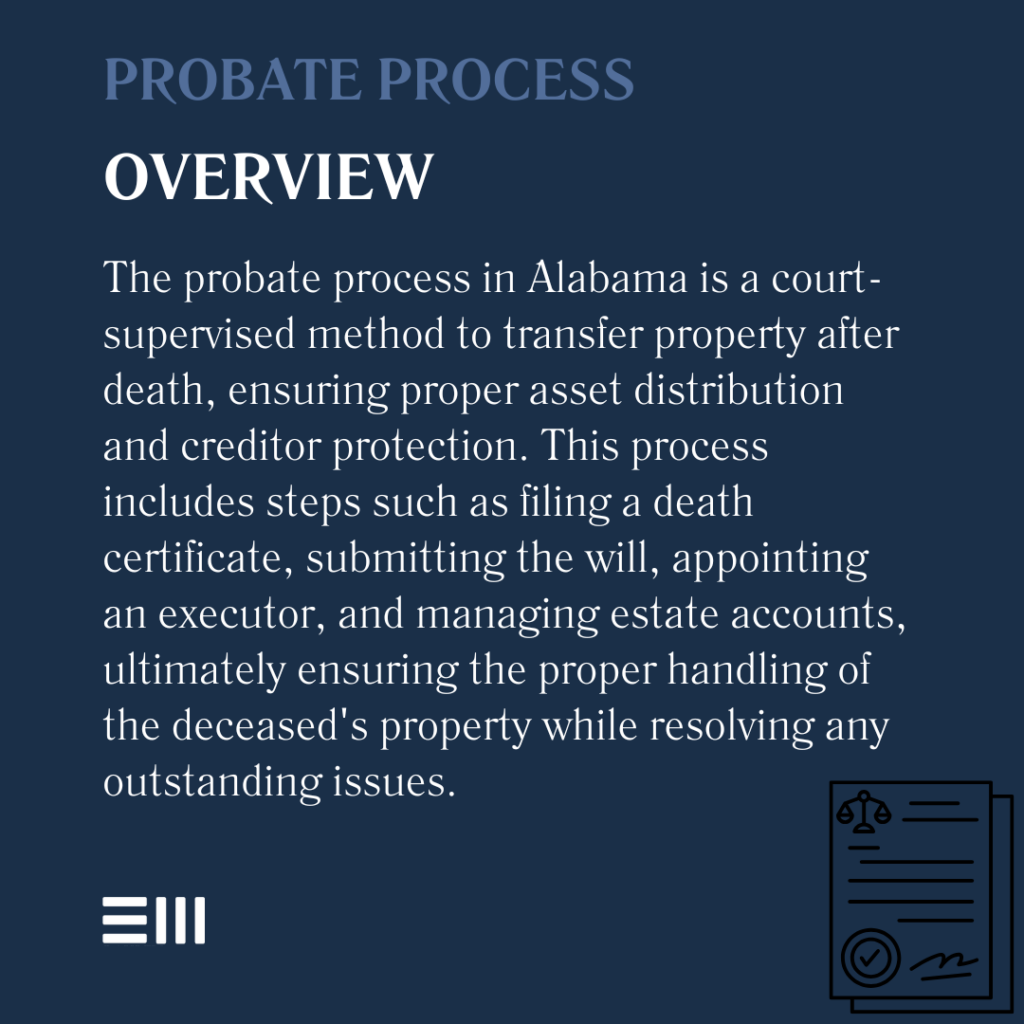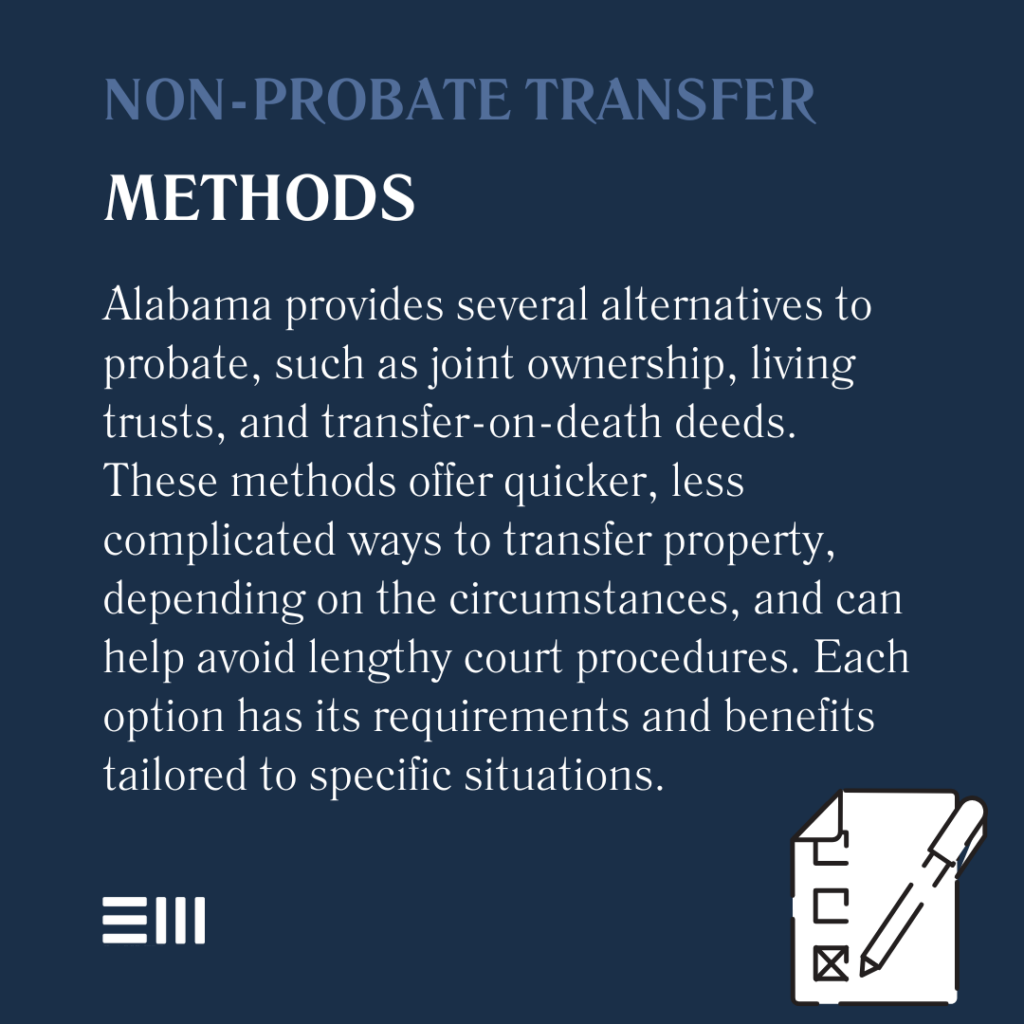
In the quiet moments after loss, families gather around kitchen tables, sorting through papers and memories.
A home that once echoed with life now sits at the center of complex legal questions. Beyond grief, Alabama families face the challenge of navigating property transfer—a process that touches everything from cherished family homes to long-held investment properties, each with its own story and significance.
While legal procedures may seem overwhelming during this sensitive time, understanding the path forward helps families honor their loved one’s wishes while protecting their legacy.
Understanding Property Transfer Options
Alabama offers several pathways for transferring property after death. Each method serves different situations and needs, providing flexibility in handling estate transitions.
The choice of transfer method affects not only the property’s disposition but also the time, cost, and complexity of the process. Understanding these options helps families make informed decisions during a challenging time.
Careful consideration of each pathway ensures the most appropriate choice for your specific circumstances.
Types of Property Ownership
Different forms of property ownership affect how assets transfer after death. Understanding these distinctions helps determine the appropriate transfer method.
Common ownership types include:
- Individual ownership;
- Joint tenancy with rights of survivorship;
- Tenancy in common;
- Life estates;
- Community property;
- Trust ownership;
- Corporate ownership;
- Partnership interests;
- LLC membership interests;
- Cooperative shares;
- Tenancy by entirety;
- Leasehold interests;
- Equitable ownership;
- Beneficial ownership; and
- Fractional interests.
Each ownership type carries specific implications for property transfer after death.
Alabama Probate Process Overview
The probate process represents the traditional path for transferring property after death in Alabama. This court-supervised procedure ensures the proper distribution of assets.
Key steps in the probate process include:
- Filing the death certificate;
- Submitting the will if one exists;
- Appointing an executor or administrator;
- Creating estate inventory;
- Notifying creditors and heirs;
- Paying valid claims and taxes;
- Distributing remaining assets;
- Filing final accounting;
- Closing the estate;
- Recording property deeds;
- Resolving title issues;
- Managing property maintenance;
- Handling tax assessments;
- Addressing utility transfers;
- Completing insurance changes;
- Conducting property appraisals;
- Settling outstanding mortgages;
- Managing estate accounts;
- Coordinating with professionals; and
- Documenting all transactions.
These steps ensure proper handling of the deceased’s property while protecting all interested parties.

Non-Probate Transfer Methods
Not all property must go through probate. Alabama law recognizes several alternatives that can simplify the transfer process.
Available alternatives include:
- Joint ownership with survivorship;
- Transfer on death deeds;
- Living trusts;
- Beneficiary designations;
- Life estate arrangements;
- Small estate procedures;
- Affidavit of heirship;
- Direct succession;
- Family settlement agreements;
- Summary distribution;
- Simplified administration;
- Informal family arrangements;
- Property law exemptions;
- Statutory shortcuts;
- Municipal transfer options;
- Payable on death accounts;
- Enhanced life estate deeds;
- Beneficiary deed options;
- Community property agreements; and
- Transfer-on-death registration.
Each method carries its own requirements and limitations that affect its suitability.

Required Documentation
Proper documentation plays a crucial role in property transfers. Understanding necessary paperwork helps prevent delays and complications.
Essential documents include:
- Original death certificate;
- Property deed;
- Last will and testament;
- Letters testamentary;
- Tax clearance certificates;
- Title insurance policies;
- Property surveys;
- Mortgage statements;
- Tax assessment records;
- Utility bills;
- Insurance policies;
- Property appraisals;
- Heir affidavits;
- Identity verification;
- Court orders;
- Marriage certificates;
- Divorce decrees;
- Military discharge papers;
- Business ownership records; and
- Trust documents.
Complete and accurate documentation streamlines the transfer process significantly.
Tax Implications of Property Transfer in Alabam
Property transfers after death can trigger various tax considerations. Understanding these implications helps in planning and executing transfers effectively.
Important tax considerations include:
- Estate tax thresholds;
- Property tax reassessment;
- Income tax basis;
- Capital gains implications;
- Gift tax exclusions;
- State tax requirements;
- Federal tax obligations;
- Inheritance tax issues;
- Property value assessment;
- Tax exemption eligibility;
- Basis step-up rules;
- Transfer tax calculations;
- Annual exclusion limits;
- Generation-skipping tax;
- Special use valuations;
- Agricultural tax provisions;
- Business succession impacts;
- Charitable donation effects;
- Foreign property implications; and
- Tax treaty considerations.
Proper tax planning can minimize financial impact while ensuring compliance.
Title and Deed Considerations
Property title and deed issues require careful attention during transfers. Understanding these elements helps ensure clean title passage.
Important aspects include:
- Title search requirements;
- Chain of title review;
- Deed preparation;
- Recording requirements;
- Legal description accuracy;
- Encumbrance identification;
- Lien satisfaction;
- Easement transfers;
- Covenant compliance;
- Restriction verification;
- Mineral rights status;
- Water rights transfer;
- Access rights confirmation;
- Boundary verification; and
- Survey requirements.
Proper handling of title issues prevents future complications.
Common Challenges and Solutions
Property transfers often face obstacles. Recognizing potential challenges helps in developing effective solutions.
Typical challenges include:
- Missing documents;
- Title defects;
- Creditor claims;
- Family disputes;
- Property maintenance;
- Tax complications;
- Multiple heirs;
- Out-of-state property;
- Mortgage assumptions;
- Environmental issues;
- Zoning violations;
- Boundary disputes;
- Tenant rights;
- Utility transfers;
- Insurance gaps;
- Contested wills;
- Unknown heirs;
- Property damage;
- Deferred maintenance; and
- Market conditions.
Early identification of these issues allows for proactive problem-solving.
Special Property Considerations
Different types of property require specific handling during transfer. Understanding these distinctions helps ensure proper transfer procedures.
Property types include:
- Primary residences;
- Rental properties;
- Commercial real estate;
- Agricultural land;
- Mineral rights;
- Timeshares;
- Vacation homes;
- Investment properties;
- Historic properties;
- Conservation easements;
- Development rights;
- Water rights;
- Access easements;
- Restricted properties;
- Special use properties;
- Mobile homes;
- Manufactured housing;
- Condominiums;
- Cooperative units; and
- Business properties.
Each property type may require unique documentation or procedures.
Executor and Administrator Duties
Personal representatives have specific responsibilities in property transfers. Understanding these duties helps ensure proper estate administration.
Key responsibilities include:
- Asset inventory creation;
- Property maintenance;
- Bill payment;
- Tax filing;
- Heir communication;
- Court reporting;
- Property marketing;
- Sale negotiations;
- Distribution planning;
- Record keeping;
- Professional coordination;
- Dispute resolution;
- Insurance management;
- Investment oversight; and
- Final accounting.
Proper execution of these duties protects both the estate and its beneficiaries.
Frequently Asked Questions About Property Transfer in Alabama
Families often share common concerns about transferring property after death.
Here are answers to frequently asked questions about the property transfer process in Alabama.
How Long Does Property Transfer Take?
Timeline varies from weeks to months depending on transfer method and complications.
Can Property Transfer Without a Will?
Yes, Alabama laws of intestate succession govern property distribution without a will.
What if Multiple Heirs Disagree?
Court intervention may be necessary to resolve disputes between heirs.
Are There Ways to Avoid Probate?
Several methods exist to transfer property outside probate, including joint ownership and trusts.
How Much Does Property Transfer Cost?
Costs vary based on property value, transfer method, and professional services needed.
Can Property Transfer Before Death?
Yes, various estate planning tools allow property transfer during lifetime.
What About Business Property?
Business property may require special handling depending on organizational structure.
How Are Mortgages Handled?
Mortgage obligations must be addressed during property transfer through various means.
Secure Your Family’s Legacy
Navigating property transfer after loss shouldn’t add to your family’s burden.
Our experienced estate attorneys understand Alabama property law and can guide you through each step of the transfer process with compassion and expertise.
Contact us to discuss your situation and develop a strategic plan for your property transfer needs.
Can't find what you're looking for? Search our site below.










